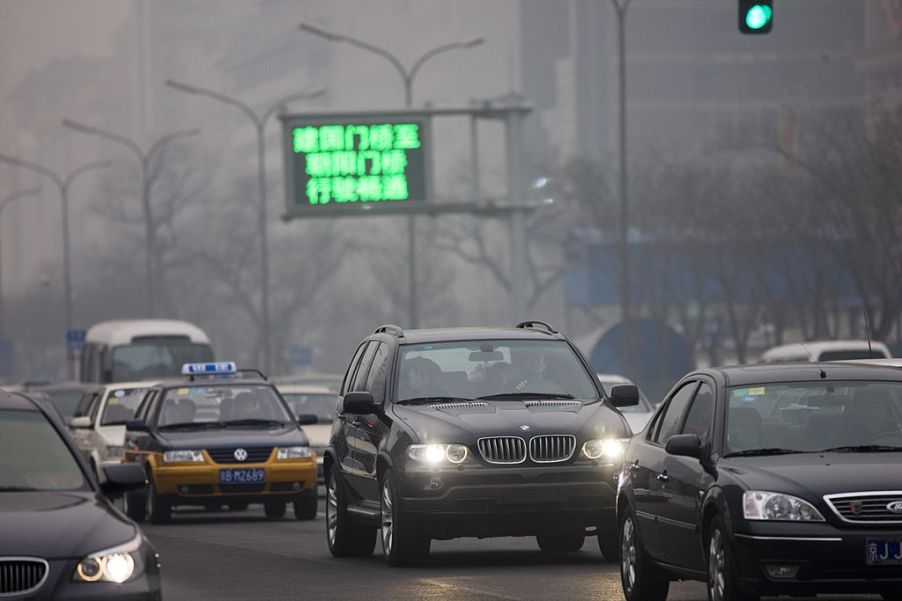
SUVs Guzzling up Fuel Savings, not Pickup Trucks
Even before the Intergovernmental Panel on Climate Change released its report, industries around the world started to at least attempt to curtail emissions. The automotive world, in particular, accelerated their environmental plans. With both the IPCC report and Dieselgate, the push for more EVs has never been stronger.
However, in the meantime, gasoline still reigns supreme. And unfortunately, despite improvements in fuel efficiency, we’re consuming more of it. In a recent report by the International Energy Agency, they concluded that the increased presence—and fuel consumption—of SUVs is canceling out other cars’ fuel savings.
The IEA Report
The full IEA report is due in its World Energy Outlook 2019 report, which will be published in November. However, as Jalopnik reports, the released commentary reveals some startling information.

The first is the car market slow-down. In 2018, global sales of internal-combustion cars fell by approximately 2%, to just under 87 million. This was a first since the 2008 recession. 2019 isn’t finished yet, but initial data shows sales will continue to drop, based on forecasts from China and India. In the first half of the year, Chinese sales fell roughly 14%, and in India 10%.
Car sales may be down overall, but those sales are increasingly dominated by SUVs. There were roughly 35 million SUVs on the road worldwide in 2010; now there’s over 200 million, making up more than 60% of all cars on the road. And SUVs now account for double the annual car sales they did a decade ago: 40% now vs 20% then.

The increased number of cars on the road—all kinds of cars—is but one reason why global CO2 emissions actually rose in the 2010-2018 period. Interestingly, the IEA reports that non-SUV ICE passenger car emissions actually dropped in that period. But there are now so many SUVs on the road, that they’re the second-largest contributor to the rise in global CO2 emissions. Only the power sector generated more CO2.
In fact, rising SUV demand hasn’t just offset fuel efficiency improvements from smaller cars, but also the rise of EVs. The IEA reports that passenger cars saved approximately 2 million barrels of oil per day, and EVs just under 100,000 a day. But the growth in SUVs removed all those gains, and then some. Most likely due to customers swapping fuel-efficient small cars for upscale SUVs.
A Closer Look at SUV vs. Truck Emissions and Fuel Consumption

The IEA report does not separate SUVs and trucks between personal and commercial usage. However, both in this report and previous information releases, the agency clearly differentiates the two.
Indeed, trucks have their own category in the 2010-2018 graph shown above. And it’s clear that trucks, while they did cause growth in global CO2 emissions, their contribution was significantly less than the SUVs’. In fact, while SUVs were solely responsible for the 3.3 million barrels a day growth in global oil demand for passenger cars, oil use from every other type of car—including trucks—actually declined slightly.
There is another aspect of the truck vs. SUV trend, though. Although pickup trucks are increasingly offered with luxury interiors and features, SUVs are still the predominant symbols of wealth. Especially, as the IEA states, in China. In India and Africa, too, although SUV sales are lower, more and more people are beginning to afford them. Consumers there will begin to demand premium SUVs much like consumers in the US, Europe, and China do.
Moving Forward to Offset SUV Gas-Guzzling

Automakers have put in motion plans to introduce more EVs. However, most of these are small-to-medium passenger cars, not SUVs. The Porsche Taycan is very cool, but it alone won’t make up for all the SUVs people buy. Even if automaker predictions are accurate, in a decade EVs will only account for 7% of the global car fleet.
You might say that the logical solution is just to make electric SUVs. While that would be very beneficial, it has its own drawbacks. Adding batteries onto an already heavy SUV will still make it less efficient than an electric passenger car. In the near future, fossil fuels will still play a role in generating electricity, so even an electric SUV won’t be as clean as a passenger car EV.
That’s not to say pushing for electrification is pointless. At the moment, both gas and SUVs are relatively cheap. If gas gets more expensive, and EVs get cheaper, the SUV pendulum may swing back.
Arguably, though, the best solution may also be the most difficult to implement. People are buying SUVs to show off their status and wealth. If society stops valuing the symbol like that, demand may fall off. Basically, we have to stop worrying about showing off for others. Maybe ride a bike, if you can.
Buying trucks instead will probably be easier.


